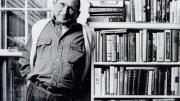Justin Kaplan ’45, G ’47, who won a Pulitzer Prize and National Book Award for his first biography of Mark Twain, died on March 2. His biographies of Walt Whitman and Lincoln Steffens, and his other books about life and lives in America attracted readers for their humanity and style as well as for their substance. (For his take on biographical sketches by another author, Rachel Cohen ’94, read his review of A Chance Meeting: Intertwined Lives of American Writers and Artists.) He also tackled autobiography, writing a joint memoir, Back Then: Two Lives in 1950s New York with his wife, novelist Anne Bernays, who survives him.
Kaplan was also a longtime friend of and occasional contributor to this magazine. When he was reviewing proofs for the seventeenth edition of Bartlett’s Familiar Quotations, his second go-round as editor of that cultural landmark, then managing editor Christopher Reed paid him a visit to learn something about his modus operandi: “What the Meaning of the Word ‘Is’ Is.”









